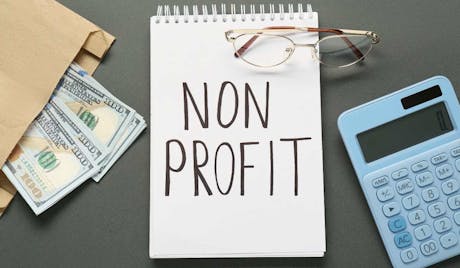Hong Kong offers tax exemptions, funding opportunities, and a supportive legal framework for non-profits.
Non-profits can register as a Company Limited by Guarantee or a Society and must comply with governance and reporting regulations.
Annual reporting and strict adherence to Section 88 are essential for maintaining tax-exempt status and credibility.
Diversifying funding, leveraging technology, and global collaborations help overcome challenges and enhance impact.
Starting a non-profit in Hong Kong combines passion and purpose to create meaningful societal impact.
This guide covers everything you need to know — from legal structures and tax exemption to fundraising strategies and compliance.
Non-Profit Organization (NPO) vs. Non-Governmental Organization (NGO) in Hong Kong
An NPO in Hong Kong is set up for a purpose other than making a profit. It doesn’t have owners or shareholders.
Any income or surplus it makes stays in the organization and is used to support its mission. NPOs focus on causes like education, health, social welfare, or the environment. They can’t pay out profits to members.
The terms NPO and NGO often get mixed up. Here’s the simple difference:
- An NGO is any group that operates independently from the government. It can be for-profit or non-profit.
- An NPO is always non-profit. No profit goes to members or individuals.
Not all NPOs are charities.
To be legally recognized as a charity in Hong Kong, your organization must be approved by the Inland Revenue Department (IRD) under Section 88 of the Inland Revenue Ordinance.
Without Section 88 status, your organization still has to pay taxes — even if it's non-profit.
Just calling your group an NPO isn’t enough. The IRD decides if your purpose qualifies as charitable.
Directories like HKNGO only tag an organization as “Non-Profit” if it’s officially approved under Section 88.
Types of Non-Profit Organizations in Hong Kong
Educational Institutions
These organizations aim to improve education for students, especially in underserved communities or in specific subjects. They work to create better learning opportunities and outcomes for young people.
Health Organizations
Nonprofits focused on health work to improve public well-being. They may run hospitals, clinics, or support groups, and often lead public health campaigns or conduct medical research to help people live healthier lives.
Cultural Associations
These groups help protect and celebrate Hong Kong’s cultural heritage and diversity. They organize cultural events, exhibitions, performances, and educational programs to share local traditions and history with the public.
Charities
Charities provide help to people in need. They offer food, shelter, financial support, and other types of aid to low-income individuals and families. Some charities also focus on special causes like fighting poverty, helping during natural disasters, or supporting people with disabilities.
Why Set Up a Non-Profit in Hong Kong?
Now that you understand what a non-profit organization is and how it works in Hong Kong, let’s look at why this city is one of the best places to start one.
Impactful Work in a Global Hub
Starting a non-profit in Hong Kong means you can create real change in areas like:
- Poverty reduction
- Education access
- Social justice
- Environmental protection
You’ll also benefit from:
- A collaborative nonprofit ecosystem
- Strong links with public bodies, international donors, and local partners
- Opportunities to pilot and scale impactful ideas
It’s a meaningful way to contribute to society — and also a professionally rewarding path for founders and changemakers.
Tax Exemption Under Section 88
Charities in Hong Kong can apply for tax exemption under Section 88 of the Inland Revenue Ordinance — but only if they meet strict conditions.
To qualify:
- Your organization must be set up solely for charitable purposes
- It must serve a public benefit
- It must operate lawfully
- It cannot distribute income or assets to members
Recognized charitable purposes include:
- Relief of poverty
- Advancement of education
- Advancement of religion
- Other community benefits (e.g. health, environment, animal welfare)
📌 You'll need a clear governing document outlining:
- Objectives
- How funds are used
- What happens to assets if the organization is dissolved
Be careful: If your charity’s activities no longer align with its original purpose, or if it misuses funds, the IRD can revoke its tax-exempt status and apply back taxes or penalties.
Note on income: Business or trading profits are only tax-exempt if:
- The activity directly supports your charitable purpose
- Profits are fully used for charitable work
- Most of the income is spent in Hong Kong
- (In some cases) the work is done by your charity’s beneficiaries
Easier Access to Grants and Partnerships
Hong Kong is rich in funding opportunities for non-profits, including:
- Local philanthropic foundations
- International NGOs
- CSR programs from banks, tech firms, and global corporations
These partnerships often provide more than money:
- Staff training
- Visibility and credibility
- Access to shared infrastructure and long-term support
Plus, being in Hong Kong gives you:
- A platform to connect with regional and international donors
- A pathway to cross-border collaborations
- Greater appeal to funders — especially if you’re registered as a Section 88-approved charity
💡 Donations to approved charities are tax-deductible under:
- Section 16D (for corporations)
- Section 26C (for individuals)
Types of Legal Structures for Non Profits in Hong Kong
In Hong Kong, non-profits can choose from three main legal structures. Each comes with its own setup process, governance standards, and level of flexibility.
The most common structure is a Company Limited by Guarantee. This is ideal for NPOs that want legal protection, transparency, and long-term growth.
A Society is simpler and better suited for smaller or informal groups. It's easier to register but offers fewer legal safeguards.
A Charitable Trust is flexible and quick to set up but doesn’t have a legal personality. That means it can't hold property or sign contracts in its own name.
Here's a quick comparison:
| Structure | Legal Entity | Liability Protection | Best For | Key Requirement |
|---|---|---|---|---|
| Company Limited by Guarantee | Yes | Yes | Medium to large NPOs | Articles of Association, at least 2 members |
| Society (Societies Ordinance) | No | Limited | Small community-based groups | Must register with the Societies Office |
| Charitable Trust | No | No | Flexible or short-term causes | Trust deed and trustee(s) only |
Only companies limited by guarantee offer full limited liability to members. Societies and trusts do not provide this same level of personal protection.
Legal Foundations and Compliance Requirements for Non-Profit Formation
Forming a non-profit in Hong Kong means complying with several key laws and ordinances.
Regulatory Framework
Your legal obligations will depend on your chosen structure, but the framework is built around transparency, accountability, and public benefit.
The two main laws you’ll deal with are:
- Companies Ordinance (Cap. 622) — for companies
- Societies Ordinance (Cap. 151) — for societies
Additional laws may apply based on your operations, such as:
- Anti-Money Laundering and Counter-Terrorist Financing Ordinance (Cap. 615)
- Personal Data (Privacy) Ordinance (Cap. 486)
- Prevention of Bribery Ordinance (Cap. 201)
Before registering, make sure your non-profit’s name, objectives, and structure comply with all current legal standards. Some names or terms (e.g., “foundation,” “council,” “authority”) may require additional vetting or approval.
Compliance Requirements
Before registering your non profit organization, make sure you're fully aware of the compliance obligations that come with it.
| Requirement | Details |
|---|---|
| Annual Return Filing | File Form NAR1 yearly with the Companies Registry. Update info on directors, company secretary, registered address, and members. |
| Audited Financial Statements | Prepare annual audited accounts. Required if you fundraise publicly. Upload them online for transparency and donor confidence. |
| IRD Charity Review | Submit financial statements and activity reports annually to the IRD to maintain your Section 88 status. Misalignment with your charitable objectives may lead to exemption loss. |
| Annual Activity Summary | Include summaries of key achievements, financial use, and future plans in your reporting. This helps maintain public trust and attract supporters. |
| Recordkeeping | Maintain accurate records of income, expenses, meeting minutes, and board decisions. Must be available for audits and IRD review. |
| Governance Oversight | Conduct regular board meetings. Assign clear roles and monitor board performance. Poor governance can risk compliance and legal standing. |
| Governance Policy Development | Implement and review policies covering conflicts of interest, ethical conduct, and financial controls. Ensure accountability at all levels. |
Step-by-Step Guide to Incorporation
Now that you're clear on the legal framework and compliance requirements, here's a step-by-step guide to officially incorporate your non-profit in Hong Kong.

Registering an NPO requires following the traditional steps to register a company in Hong Kong.
1. Reserve and Approve Your Organization’s Name
- Choose a unique name that aligns with your mission and values.
- Check the availability and compliance of your desired name using the Companies Registry’s online system.
2. Prepare and Submit Documents
Draft the Articles of Association, clearly stating your objectives, governance rules, and dissolution terms.
Prepare the Notice to Business Registration Office for tax registration.
Gather supporting documents:
- Identity details of directors and members (at least 18 years old)
- A short operational plan or activity outline
- Proof of registered office address
Submit the full package to the Companies Registry with the appropriate fee.
3. Appoint Directors and Officers
Appoint at least one director.
Assign a company secretary who is a local company secretary (individual resident or corporate entity)
All directors and officers must understand their legal and fiduciary responsibilities under Hong Kong law.
4. Obtain Certification and Open a Bank Account
Once approved, receive your Certificate of Incorporation.
Use it to apply for a Business Registration Certificate from the Inland Revenue Department.
Open a dedicated non-profit bank account.
Fundraising Strategies and Financial Management for Non-Profit in Hong Kong
Raising funds is essential to keeping your non-profit running and expanding your impact. In Hong Kong, combining digital tools with traditional methods — while staying compliant — gives you the best shot at sustainable funding.
1. Crowdfunding and Online Donations
Platforms like FringeBacker (Hong Kong-based), GoFundMe, and Kickstarter can help you collect donations locally and globally. To run a successful campaign:
- Keep your message focused: What’s the goal? Who benefits? Where will the funds go?
- Use visuals like short videos, real photos, and infographics to build trust.
- Post regular updates showing how funds are being used. Transparency encourages repeat support.
- Set up a secure donation gateway on your website using tools like Stripe, PayPal, or local options like Tap & Go. Make it mobile-friendly to encourage impulse giving.
Note: Ensure payment gateways are compliant with Hong Kong’s personal data and cybersecurity regulations, especially if you're handling donor information.
2. Community and Event-Based Fundraising
Organizing mission-aligned events—such as charity walks, art auctions, benefit dinners, or public workshops—helps raise money while engaging the community.
- Partner with local businesses as sponsors or in-kind contributors.
- Invite influencers, community leaders, or celebrities to boost reach.
- After the event, share impact results and thank donors publicly (via newsletters or social media).
If you fundraise from the public:
- You must prepare audited financial statements for each campaign.
- These records must be made available to the public if requested.
- Ensure your fundraising activities remain compliant with IRD rules under your Section 88 status.
Section 88 status doesn’t automatically exempt you from public fundraising regulations. Depending on the scale and nature of the campaign, you may need permits from relevant government departments (e.g., Food and Environmental Hygiene Department for street fundraising).
3. Corporate Sponsorships
Many companies in Hong Kong run Corporate Social Responsibility (CSR) programs and are open to partnerships with non-profits.
Approach them with clear proposals:
- What’s in it for them? What social value are you creating?
- Offer visibility, such as logos on materials, mentions at events, and co-branded campaigns.
- Track outcomes and share reports regularly to retain long-term support.
4. Grant Applications and Matching Gifts
Apply for local and international grants from:
- Hong Kong government agencies
- Charitable foundations
- Multinational corporations with regional programs
Many large employers in Hong Kong also offer matching gift programs—where they match their employees’ donations to approved charities (often 1:1). Promoting these programs can double your donations at no extra cost.
Make sure your Section 88 approval is clearly stated on your website and donation materials, as this helps corporate donors confirm your tax-deductible status.
5. Financial Management Best Practices
Good financial management is just as important as fundraising itself. To stay on track:
- Set up a realistic budget and review it monthly.
- Monitor cash flow to avoid delays in salaries or program delivery.
- Appoint a financial coordinator or establish a finance committee to oversee spending and ensure accountability.
- Keep donors in the loop with thank-you notes, impact updates, and progress reports.
Stay Compliant with Tax and Reporting Rules
If your NPO is approved under Section 88 of the Inland Revenue Ordinance, you're exempt from profits tax. But that status comes with obligations.
You must:
- Submit audited financial statements each year
- File annual activity reports to the Inland Revenue Department (IRD)
- Show that all income is used for approved charitable purposes
You must not:
- Use funds for non-charitable or personal purposes
- Engage in commercial activities unless they directly support your mission and meet all IRD conditions
Non-compliance may result in loss of tax exemption, back taxes, and penalties.
Challenges and Growth Opportunities
Overcoming Common Hurdles

Running a non-profit in Hong Kong comes with real challenges: competition for funding, tight operating margins, and strict regulatory requirements.
To stay resilient:
- Combine individual donations, grants, corporate sponsorships, and where appropriate, earned income (e.g. training services or merchandise).
- Use donor CRM systems, budgeting software, and workflow automation to manage limited resources more efficiently.
- Stay informed on legal updates by consulting compliance experts, like Air Corporate, or following IRD/Companies Registry circulars.
Leveraging Global Collaborations
Partnering with international NGOs, regional alliances, and global foundations can expand your visibility and impact beyond Hong Kong.
Opportunities include:
- Joint campaigns or shared service delivery models
- Access to shared technology, training resources, or research
- Cross-border grant programs and multi-country funding calls
Last Words
Starting a non profit organization in Hong Kong is a rewarding endeavor that combines passion with purpose. With the right approach, your organization can make a lasting impact, empowering communities and driving meaningful change.
Let Air Corporate assist you with the process of registering your company. Get in touch with us now!
FAQs
Yes. There is no nationality requirement for directors or members of a Company Limited by Guarantee. The company secretary must be a Hong Kong resident or a local corporate secretary.
Company registration takes 5–7 working days. Section 88 approval may take 3–6 months, depending on the application’s completeness and complexity.
The IRD can revoke your tax exemption. You may face back taxes, penalties, or audits. Common issues include misuse of funds, missing reports, or failure to follow your stated objectives.






